Posts Tagged ‘Boston’
Boston City Council Passes Truck Side Guard Ordinance
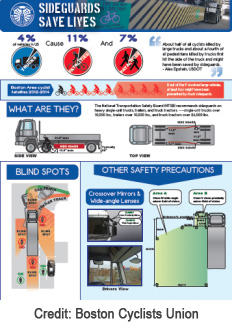 The Boston City Council has passed the Truck Side Guard Ordinance, the first of its kind in the nation. The ordinance will require side guards, convex mirrors, cross-over mirrors, and blind-spot awareness decals on all city-contracted vehicles over 10,000 pounds (or for tractor-trailer trucks with a combined weight over 26,000 pounds).
The Boston City Council has passed the Truck Side Guard Ordinance, the first of its kind in the nation. The ordinance will require side guards, convex mirrors, cross-over mirrors, and blind-spot awareness decals on all city-contracted vehicles over 10,000 pounds (or for tractor-trailer trucks with a combined weight over 26,000 pounds).
This ordinance passed quickly and unanimously last week. Mayor Martin J. Walsh, At-Large Boston City Councilor Ayanna Pressley and the Boston Cyclists Union, a non-profit advocacy group, filed the proposed ordinance on September 9th; it was approved by the council on Oct. 29th. It takes effect 180 days after passage and applies to all future contracts.
Side guards are meant to reduce injuries to drivers, cyclists and pedestrians by closing off the space under a truck. The National Transportation Safety Board recommended a side guard protocol last April, reporting that large truck side impacts comprised of 15 percent of fatal two-vehicle collisions between large trucks and passenger vehicles in 2011. In the United Kingdom, mandated side guards on large trucks reduced cyclist deaths by 61 percent and serious injuries to cyclists by 13 percent, according to a Transport for London study.
Boston’s goal is to protect cyclists, pedestrians and other drivers, but cyclists have faced especially hard road conditions in recent years. Since 2010, 11 cyclists have been killed in Boston, seven in bike accidents which involved a truck or bus, according to city figures. Injuries to cyclists from other causes have also increased, even though the city has developed Boston’s cycling infrastructure dramatically in recent years. The City continues to expand bike lanes and to work on cycle track projects which will put a physical barrier between cyclists and traffic.
Others may soon follow Boston in passing a truck side guard ordinance. Lawmakers in New York have proposed legislation that would mandate side under-ride guards on trucks, tractors, tractor trailers and semi-trailers. In Massachusetts, Somerville, Cambridge and Newton are also considering ordinances. Elsewhere, Portland and Washington D.C. also have proposed legislations or restrictions.
A few additional points:
Pilot Program. Boston began looking at truck side guards in 2013, when the Mayor’s Office of New Urban Mechanics and the city’s Public Works Department undertook a municipal pilot study of truck side guards.
Inspection. Vehicles associated with an awarded city contract will be inspected for side guards by the Inspectional Services Department and issued a permit, certifying the vehicle for 2-years.
Enforcement. Businesses will face a fine for vehicles which are not in compliance. The fines start at $100 for the first offense and rise with repeated violations to potential contract termination. The Boston Police Department will assist with enforcement.
Other City Offices. The Boston Transportation Department and Boston Bikes will assist with education, content expertise on best practice and as the point of contact for constituent reporting.
Exemptions. There are some exemptions, such as for trucks which are used exclusively for snow plowing or emergency vehicles.
Read more about Boston’s new truck ordinance.
About Breakstone, White & Gluck
The Boston personal injury lawyers at Breakstone, White & Gluck have over 100 years combined experience representing injured cyclists and pedestrians. For a free legal consultation, visit 800-379-1244 or 617-723-7676 or use our contact form.
Replace Your Smoke Alarm Batteries As Daylight Saving Time Ends
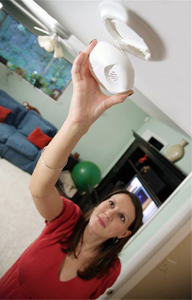 Many of us are thinking about Halloween today. But Daylight Saving Time also ends this weekend. While setting your clocks back, remember to replace your smoke alarm batteries and test to make sure they work properly.
Many of us are thinking about Halloween today. But Daylight Saving Time also ends this weekend. While setting your clocks back, remember to replace your smoke alarm batteries and test to make sure they work properly.
As we approach winter, we increase use of electrical appliances and the risk for home heating fires rise. In fact, half of all home heating fires happen in December, January and February. The death rate in homes with no working smoke alarms is twice as high as those with alarms, according to the National Fire Protection Association. Often, homes have smoke alarms but the batteries are missing disconnected or dead.
Make as many of these safety checks as you can this weekend:
Smoke alarms. Replace your smoke alarm batteries in every unit of your home and smoke alarms which are 10 years old. Also check if your smoke alarm model has been recalled. Kidde recalled 1.2 million smoke and carbon monoxide alarms in September. You can search for other recalls at www.cpsc.gov.
Carbon monoxide detectors. The state of Massachusetts began requiring carbon monoxide detectors in every residence in 2006 and many home owners have passed the 5-7 year lifespan of their models. Check if yours needs to be replaced. If you have a combination smoke alarm/carbon monoxide detector, check the unit’s specific instructions.
Washing machines and dryers. Clothes dryers are responsible for many home fires, but most can be prevented by regularly checking and cleaning the filters. Clean your models out now.
Cooking. Unattended cooking is the leading cause of cooking fires. Clear out any clutter in your kitchen now so you have plenty of room to set out your ingredients in advance. Find a cabinet or drawer to store anything you may need so you do not have to leave the room while cooking. Make sure you have a functioning fire extinguisher.
Home heating. Arrange for oil delivery or have your chimney or wood stove professionally cleaned. If you are using a space heater, take a few minutes to read our home heating safety tips. Each year, space heaters cause 80 percent of home heating fire deaths and one third of all home heating fires.
Get ready for the snow. Get your snow hat, gloves, shovel and road salt ready now and set them aside in the same place throughout the winter. When it snows, you want to be able to easily find them so you can clear your front steps and driveway so no one slips and falls in the snow and ice.
Cords. Walk through every room of your home and see what is plugged into the electrical outlets. Look under beds, behind computers, in power supplies and in your children’s rooms. Unplug cords you are not using and put them in a drawer until you need them. Pay extra attention to the USB cords for your tablets and cell phones and replace them if they look old or worn.
Get your car ready. Take a few precautions and reduce the stress of traveling in the snow. Collect and pack away ice scrapers and small shovels as well as an extra hat, pair of gloves and clothing in case you become stuck while traveling. Also pack a couple flashlights, a non-perishable snack, such as a granola bar, and make sure all your vehicle paperwork is easily accessible in the glove compartment.
Read More
Check Your Car’s Airbags After Recalls Linked to Four Deaths, Injuries
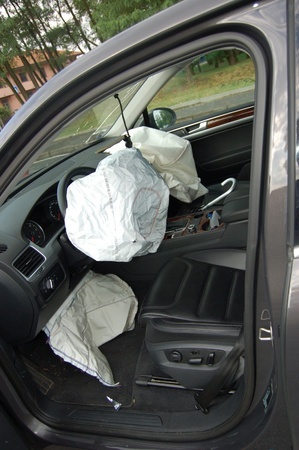 Last week, the National Highway Traffic Safety Administration (NHTSA) issued an advisory urging the public to act immediately on recall notices impacting 7.8 million cars with Takata airbags. The airbags are now linked to four deaths and more than 100 injuries.
Last week, the National Highway Traffic Safety Administration (NHTSA) issued an advisory urging the public to act immediately on recall notices impacting 7.8 million cars with Takata airbags. The airbags are now linked to four deaths and more than 100 injuries.
If you have not already done so, please immediately check if your vehicle’s airbags have been recalled. Visit Safercar.gov. Select your auto manufacturer and enter your vehicle identification number, or VIN.
While car manufacturers are required to notify owners of recalls, do not wait to receive a letter for the company. While many of the airbags were previously recalled, you may have missed an earlier letter or may not have appreciated how serious the recall actually is.
The recalls involve Toyota, Honda, Mazda, BMW, Nissan, Mitsubishi, Subaru, Chrysler, Ford and General Motors. More than 5 million of the cars are Honda models. Many are older vehicles from the 2000-2007 model years.
After you check the site and contact your dealer, be prepared to wait. Unfortunately, many dealers do not have the parts they need to meet demand.
Prior to last week’s announcement, 2014 was already the worst year ever for auto recalls, with 50 million vehicles recalled. One in five cars in our country has a defect. General Motors (GM) paid a $35 million fine last spring and has recalled 26 million vehicles.
Why are the airbags defective?
These airbags have inflator mechanisms which can rupture and explode, sending metal and plastic shrapnel at drivers and passengers. They use excessive force. Police were investigating the death of a woman who had been in a car accident as a homicide because she appeared to have stab wounds on her neck. Then her relatives received a letter about the airbag recall to her from home from her car manufacturer. See The New York Times article, “It Looked Like a Stabbing, but Takata’s AirBag Was the Killer.”
How long will it take to get a replacement part?
It is hard to say. Some dealers already have the replacement parts ready, but others are on back order. Some car manufacturers are warning car owners not to carry front-seat passengers until the airbag defect is fixed. Toyota is telling dealers to shut the passenger seat airbags off in all vehicles that are brought in until new parts are available.
Can I get alternate transportation?
Probably not. It is unfortunate, but most of us will have to wait for the new parts to arrive. Your local dealer may also offer you a trade-in.
I did not buy my car from a dealer. I bought it from a private party.
Check your paper work from your car’s sale for the name of the dealer who originally sold the vehicle. If you cannot find this, contact any local dealer of your vehicle and ask them to assist you.
Should I purchase a car under recall?
Unless the specified repair has been made, a dealer is not allowed to sell you a car under recall and you should never purchase one under recall from a private party either.
When you are looking to buy a car, write down the model and year, then search for it online at SaferCar.gov or the Consumer Reports Recall database.
I was planning to sell my car.
You should wait for any serious defect to be repaired before selling your car. This is the safest and most ethical option regardless of the law. But there are laws to consider, including the Massachusetts Used Vehicle Warranty Law, which states private party sellers have to disclose defects to buyers.
About Breakstone, White & Gluck
The Boston product liability lawyers at Breakstone, White & Gluck have over 100 years combined experience representing clients injured by negligence in Massachusetts. If you have been injured, learn your rights. For a free legal consultation, contact us at 800-379-1244 or 617-723-7676 or use our form.
Breakstone, White & Gluck Honored by Super Lawyers for 11th Year
We are pleased to announce our attorneys have been selected as Super Lawyers for 2014. This is the 11th year they have been recognized as among the best in Massachusetts and New England.
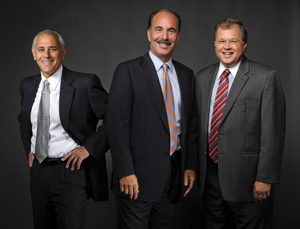
Our partners, Marc L. Breakstone, David W. White and Ronald E. Gluck, have been selected to various lists, including the Top 100 New England Super Lawyers, Top 100 Massachusetts Super Lawyers, New England Super Lawyers and Massachusetts Super Lawyers. Our associate, Samuel A. Segal, has been selected to Massachusetts Super Lawyers Rising Stars, for the second consecutive year.
Super Lawyers is a national rating service of outstanding lawyers from more than 70 practice areas who have attained a high-degree of peer recognition and professional achievement. The selection process includes independent research, peer nominations and peer evaluations. The top 5 percent of attorneys in each state are selected. The Super Lawyers list will be published in November’s edition of Boston Magazine.
Attorney Marc Breakstone was selected for the following 2014 Super Lawyers honors:
- Top 100 Massachusetts Super Lawyers
- Massachusetts Super Lawyers, Plaintiff’s Medical Malpractice
- New England Super Lawyers, Plaintiff’s Medical Malpractice
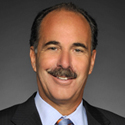 Breakstone has also been named a Top 100 New England Super Lawyer four times, in 2009, 2011, 2012 and 2013. It is the eighth year he has been recognized to the Top 100 Massachusetts Super Lawyers and his 11th year as a Massachusetts and New England Super Lawyer in the category of plaintiff’s medical malpractice.
Breakstone has also been named a Top 100 New England Super Lawyer four times, in 2009, 2011, 2012 and 2013. It is the eighth year he has been recognized to the Top 100 Massachusetts Super Lawyers and his 11th year as a Massachusetts and New England Super Lawyer in the category of plaintiff’s medical malpractice.
Breakstone has established a reputation as one of the top medical malpractice and personal injury lawyers in Massachusetts and New England. For over 25 years, he has represented clients who have been seriously injured by negligence in cases involving wrongful death, construction accidents, gas explosions and transportation and truck accidents. He is a graduate of Northeastern University School of Law.
Attorney David W. White was selected for the following 2014 Super Lawyers honors:
- Top 100 New England Super Lawyers
- Top 100 Massachusetts Super Lawyers
- Massachusetts Super Lawyers, Personal Injury General Plaintiff
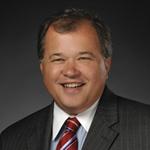 White, a past president of the Massachusetts Bar Association, has been named to the Top 100 New England Super Lawyers list three times and the Top 100 Massachusetts Super Lawyers list six times. He has been recognized on the Massachusetts Super Lawyers list in the personal injury category for 11 years.
White, a past president of the Massachusetts Bar Association, has been named to the Top 100 New England Super Lawyers list three times and the Top 100 Massachusetts Super Lawyers list six times. He has been recognized on the Massachusetts Super Lawyers list in the personal injury category for 11 years.
White has practiced law in Boston for over 25 years and specializes in personal injury cases, representing clients seriously injured in bicycle accidents, car accidents, construction accidents and those injured in product liability and premises liability cases. He is a graduate of Northeastern University School of Law.
Attorney Ronald E. Gluck has been selected for the following 2014 Super Lawyers honors:
- Massachusetts Super Lawyers, Personal Injury General Plaintiff
- New England Super Lawyers, Personal Injury General Plaintiff
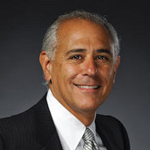 Gluck, who represented victims of the 9-11 attacks, has been selected to the Massachusetts Super Lawyers list for 10 years and New England Super Lawyers for 8 years. He has represented seriously injured clients for over 30 years in cases involving wrongful death, car and truck accidents, motorcycle accidents, liquor liability, premises liability and product liability. He is a graduate of Case Western Reserve University School of Law.
Gluck, who represented victims of the 9-11 attacks, has been selected to the Massachusetts Super Lawyers list for 10 years and New England Super Lawyers for 8 years. He has represented seriously injured clients for over 30 years in cases involving wrongful death, car and truck accidents, motorcycle accidents, liquor liability, premises liability and product liability. He is a graduate of Case Western Reserve University School of Law.
Attorney Samuel A. Segal has been selected for the following 2014 Super Lawyers honors:
- Massachusetts Super Lawyers Rising Stars for 2014
- Massachusetts Super Lawyers Rising Stars for 2013
 Segal handles personal injury cases in all areas of the firm’s practice, including medical malpractice, premises liability, car accidents and construction accident claims. He is a graduate of Northeastern University School of Law. The Rising Stars list recognizes the top 2.5 percent of lawyers in the state who are either 40 years old or younger or who have been in practice for 10 years or less.
Segal handles personal injury cases in all areas of the firm’s practice, including medical malpractice, premises liability, car accidents and construction accident claims. He is a graduate of Northeastern University School of Law. The Rising Stars list recognizes the top 2.5 percent of lawyers in the state who are either 40 years old or younger or who have been in practice for 10 years or less.
Distracted Driving Lessons in Massachusetts
 This month, students at four high schools in Massachusetts will sit down at computer simulators and learn what it feels like to text or use a cell phone while driving and then crash.
This month, students at four high schools in Massachusetts will sit down at computer simulators and learn what it feels like to text or use a cell phone while driving and then crash.
This is part of Arbella Insurance Foundation’s Distractology 101 program, which will visit Braintree High School, Phillips Academy in Andover, Falmouth High School and Sacred Heart High School in Kingston. Although the young drivers will not actually suffer or cause injury, or feel the remorse of having caused the collision, they will be taught the lesson that distracted driving behaviors, such as cell phone use, using a GPS and even eating and drinking, can result in car accidents and serious injuries. These behaviors should be considered as or more dangerous than speeding or running a red light.
Consider these statistics from the National Highway Traffic Safety Administration (NHTSA):
- 10 percent of all fatal crashes in 2011 were reported as distraction-affected crashes (3,331 people killed).
- Among those who were killed, 12 percent died in a car crash which involved cell phone use.
- Some 17 percent of all injury crashes in 2011 were reported as distracted-affected crashes (or 387,000 people injured).
- Among those who were injured, 5 percent were injured in a car accident which involved cell phone use.
Laws have been implemented to reduce the dangers caused by distracted driving. While no state bans all drivers from all cell phone use, hand-held cell phone use is not permitted in 15 states, including Vermont as of Oct. 1.
Laws related to texting while driving are much more prevalent. Texting while driving is now against the law in 44 states. Washington passed the first ban in 2007. Massachusetts implemented its law four years ago. The law, St. 2010, c. 155, bans texting by drivers, including reading, writing or sending messages. Drivers cannot text while driving or sitting at red lights, intersections or other public ways. This is a primary offense, meaning police can pull drivers over when they suspect the behavior, even without any other cause.
Despite these laws, drivers here and in other states still text and check their social media accounts. Younger drivers under 25 are two to three times more likely to text or e-mail while driving than others, according to the NHTSA. But these violations are not limited to young drivers, as the evidence is that older drivers are also engaging in this prohibited behavior.
Fortunately there is some evidence that these laws are starting to work. Recently The Journal of American Health reported that traffic fatalities had dropped 3 percent in states which have primary enforcement laws like Massachusetts. States that ban younger drivers from texting while driving saw an 11 percent drop. The journal studied national traffic data over 11 years.
States may continue to pass laws to reduce distracted driving, but drivers carry responsibility for putting down the phone and becoming aware of other distracting behaviors, such as eating and drinking, talking to passengers, grooming, reading maps, using a GPS, watching a video or adjusting a radio or music player.
There are some good safety resources out there to help families understand the problem and the attitudes and behaviors that contribute to it. We encourage you to take a look and share them with your colleagues at work and with your family, friends, and children.
For More Information
About Breakstone, White & Gluck
The Boston motor vehicle accident lawyers at Breakstone, White & Gluck have over 100 years combined experience representing clients seriously injured in car accidents. If you have been injured, it is important to learn your rights. For a free legal consultation, contact us at 800-379-1244 or 617-723-7676 or use our contact form.
Breakstone, White & Gluck Donates 150 Bike Helmets for Children in Westwood
Westwood families received free bike helmets for their children and learned about cycling and pedestrian safety at Westwood Town Day on September 27th.
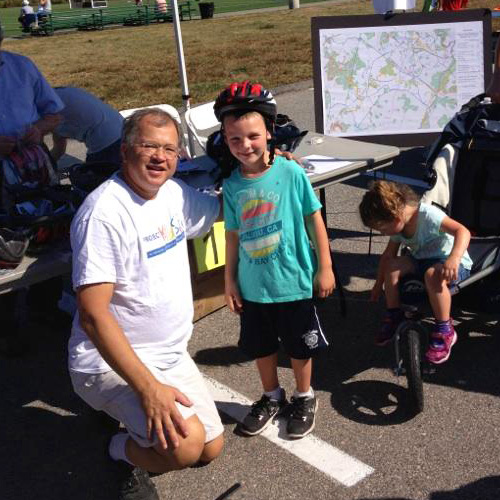
The Westwood Pedestrian and Bicycle Safety Committee hosted an informational table at the town celebration which was held at the Westwood High School. Breakstone, White & Gluck donated 150 bike helmets which were distributed to children age 16 and younger. The helmets went quickly at the annual event, which offers a fireworks display, music, food and road races for adults and children over the course of two days. Committee members fit children for the bike helmets and explained the importance of always wearing them. Attorney David White, a Westwood resident and committee member, helped fit the helmets.
In Massachusetts, children age 16 and younger are required by law to wear bike helmets. Cyclists of all ages should wear helmets to protect themselves and reduce the risk of head and brain injuries. Many cyclists neglect to do this. In fact, less than half of all cyclists actually wear helmets, according to the Centers for Disease Control and Prevention.
Breakstone, White & Gluck donated the helmets as part of Project KidSafe, our community service project to help prevent injuries among children. Our firm’s specialty is handling personal injury cases for those who have been injured, so we know firsthand the importance of injury prevention. We are devoted to keeping children safe. This is the second year we have donated bicycle helmets to organizations around the state. So far, we have donated over 2,000 helmets.
Read More
Attorney Sam Segal Elected Treasurer of Massachusetts Bar Association’s Young Lawyers Division Board of Directors
 Congratulations to our associate, Sam Segal, who has been elected treasurer of the Massachusetts Bar Association’s Young Lawyers Division Board of Directors for the 2014-2015 year.
Congratulations to our associate, Sam Segal, who has been elected treasurer of the Massachusetts Bar Association’s Young Lawyers Division Board of Directors for the 2014-2015 year.
Segal graduated from Northeastern University School of Law in the spring of 2010. He joined Breakstone, White & Gluck as an associate after completing a co-operative internship with the firm as part of his studies. He earned a double-major undergraduate degree with honors from Arcadia University in Pennsylvania.
At Breakstone, White & Gluck, he specializes in personal injury cases, including those involving car accidents, bicycle accidents, medical malpractice and construction accidents. He was selected as a Massachusetts Super Lawyers Rising Star for 2013. Segal has participated in Young Lawyers Division events for several years and also volunteers as an attorney-coach for the Cambridge Rindge and Latin School Mock Trial Team.
Breakstone, White & Gluck has long been active with the Massachusetts Bar Association. Attorney David White served as president for the 2007-2008 term. White and attorney Marc Breakstone have led Continuing Legal Education seminars over the years, in topics such as personal injury and how to start a solo law practice. The firm is also a sponsor at the annual dinner each spring.
We congratulations all the Young Lawyers Division Board of Directors. Read the full announcement.
Read More
National Child Passenger Safety Week: Check for Child Seat Recalls This Year
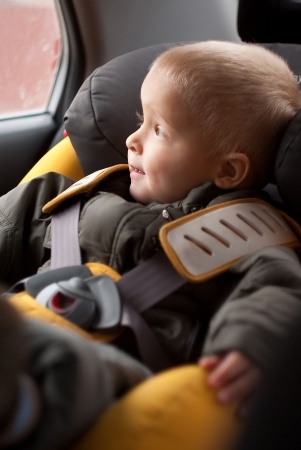 This is National Child Passenger Safety Week, when parents can get answers to common questions about driving safely with their children.
This is National Child Passenger Safety Week, when parents can get answers to common questions about driving safely with their children.
National Child Passenger Safety Week began last weekend and is observed by the National Highway Traffic Safety Administration (NHTSA) and local communities. It ends this weekend with National Seat Check Saturday.
Motor vehicle accidents are one of the leading causes of death for children in the United States. Child safety seats reduce the risk for injury if they are used properly, by more than 70 percent when it comes to infants and more than 50 percent for children age 1 to 4. But parents have long struggled with how to use them. In one study, more than 70 percent of 3,500 observed car and booster seats were misused in a way that could harm children, according to the Centers for Disease Control and Prevention (CDC).
Parents should also closely examine their child safety seat models this year. Several months ago, Graco recalled more than 6 million child safety seats, the largest car seat recall in U.S. history. Parents reported they were unable to unbuckle defective harnesses and had to cut their children out of the straps. The cause was food was getting dried up in the harnesses and causing them to stick.
Child passenger safety laws have changed over the past decade and every state now has a law for infants and children-fitting specific criteria. All but two (Florida and South Dakota) require booster seats for older children. The Massachusetts Child Passenger Safety Law requires children to ride in federally-approved child passenger safety seats that are properly secured until they are eight years old or over 57 inches tall.
Despite laws for older children, Safe Kids, a national non-profit organization, has released a new report, showing 7 in 10 parents did not know a child should be at least 57 inches or 4’9″ tall before they ride in a car without a booster seat. The organization surveyed 1,000 adults.
A few resources on child safety seats:
Check Your Car Seat Label. Become informed about the specifics of car seats. Make sure yours fits your child’s weight, size and age. For infants through age two, look for a rear-facing child safety seat. For children between ages 2 -4 or up to 40 pounds, choose a forward facing child safety seat. From age 4 to 8 or 57 inches, children should ride in belt positioning booster seats. Read more.
Car Safety Seat Checklist for Parents. Safe Kids has developed this checklist for parents.
Register Your Car Seat. Here is a resource from the NHTSA on registering your car seats with the manufacturer. This will allow the manufacturer to contact you if there is a defect.
Used Car Seat Safety Checklist. Here is a resource from the NHTSA on using used child safety seats.
Community Events. Some organizations offer free car seat safety inspections this weekend as part of National Seat Check Saturday and allow parents to make appointments with trained professionals throughout the year. Here is a directory of locations or you can contact your local police department to ask about resources in your community.
Read More
Smoke Alarm Recall Affects More Than One Million
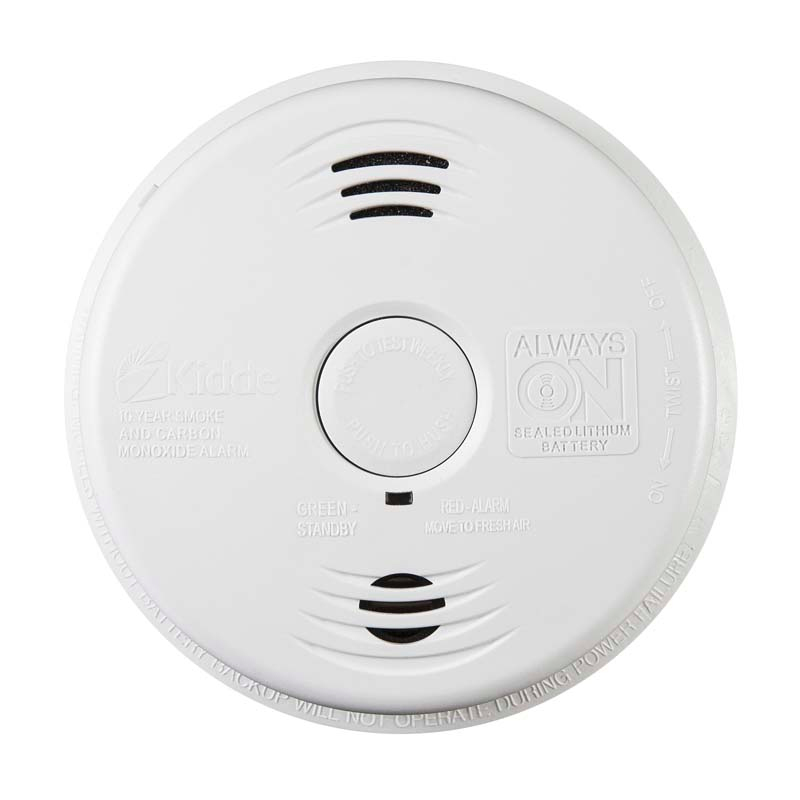 The Consumer Product Safety Commission is calling on the public to check their home smoke alarms, after more than a million units were recalled yesterday.
The Consumer Product Safety Commission is calling on the public to check their home smoke alarms, after more than a million units were recalled yesterday.
Kidde recalled 1.2 million smoke alarms in the United States and 112,000 in Canada. No injuries have been reported, but the models have a defect which may prevent them from working after a power outage. This is an important recall because each year, three to five deaths in property fires come in buildings without working smoke alarms, according to the U.S. Fire Administration.
The smoke alarms are all residential models:
- Kidde residential smoke alarm model i12010S with manufacture dates between December 18, 2013 and May 13, 2014
- Kidde Combination smoke/CO alarm il2010SCO with manufacture dates between December 30, 2013 and May 13, 2014
- Kidde Combination smoke/CO alarm model KN-COSM-IBA with manufacture date between October 22, 2013 and May 13, 2014
These smoke alarms are all hard-wired into a home’s electric system. The i12010S and il2010SCO models come with 10-year batteries inside while the KN-COSM-IBA uses replaceable AA backup batteries.
These smoke alarms look like most: white, round and are about 5 to 6 inches in diameter. Closely inspect the fine print on the front of yours for the word “Kidde.” On the backside, there is a label with the model number and manufacturing dates. “Always on” is also engraved on the front of alarms with sealed 10-year batteries.
These smoke alarms were sold at CED, City Electric Supply, HD Supply, Home Depot, Menards Inc. and other retailers. They were sold online at Amazon.com, HomeDepot.com and shopkidde.com from January 2014 through July 2014 for between $30 and $50.
Smoke Alarm Safety Tips
Daylight Saving Time. We will set our clocks back an hour for Daylight Saving Time on Sunday, November 2. The National Fire Protection Association and other safety officials recommend we also replace the batteries in our smoke alarms, test them to make sure they work and replace any models which are 10 years old.
Monthly Testing. Safety organizations also recommend we test smoke alarm batteries once a month.
Inform Others. Make sure everyone in your home knows what the smoke alarm sounds like and knows where they are located. Here is a resource for more safety and planning information.
Apartment Residents. If you rent an apartment, ask your building management company or property owner to show you the smoke alarms when you sign the lease. Contact them whenever you suspect a problem or have a question.
Read More
Defective Bean Bag Chairs Kill Two Children by Suffocation
More than two million bean bag chairs have been recalled after heartbreaking accidents in which children suffocated and died.
The Consumer Product Safety Commission (CPSC) announced last week that Ace Bayou Corp. of New Orleans, Louisiana has voluntary recalled 2.2 million bean bag chairs, including both traditional and L-shaped bean bag chairs.
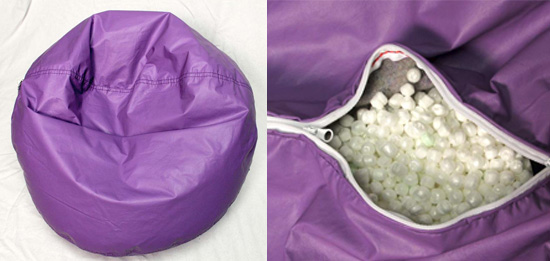
The bean bag chairs have zippers which can easily be opened, a violation of the CPSC’s voluntary standard. Children can crawl inside, become entrapped and suffocate from lack of air or choke on the chair’s foam beads.
Prompting the recall were the deaths of a 12-year-old boy from Texas and a 3-year-old girl from Kentucky. The children were found inside bean bag chairs after suffocating. The boy’s mother told the media that the bean bag chair had been in her son’s room for years and she never thought he would climb inside.
The CPSC instructs consumers to check for these bean bag chairs in their homes. For the full list of recalled models, see the end of this blog.
The chairs have two zippers. Consumers can contact Ace Bayou for a free repair kit to permanently disable the zippers. Consumers should take chairs which can be unzipped away from children.
The defective products were sold at Bon-Ton, Meijer, Pamida, School Speciality, Wayfair and Walmart and online at Amazon.com, Meijer.com and Walmart.com. They were sold prior to July 2013 for $30-$100.
Another option is to simply remove these products from your home altogether. Call Ace Bayou and ask them how to safely dispose the product. (Remember, you should never give someone a recalled product or resell it to anyone. Reselling a recalled product is against federal law.)
Bean bag chairs have a history of injuring children. In the 1990s, the CPSC received reports that 5 children died from suffocation inside bean bag chairs and 27 were injured but recovered. It then launched an industry investigation and recalled 12 million bean bag chairs. More than a dozen manufacturers were involved in that recall effort.
More Recall Information
CPSC Recall Notice Read More

